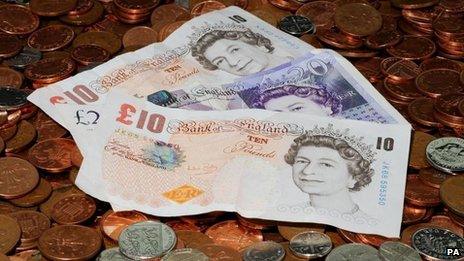The UK's loans for visas schemes
- Published
- comments

Having broadcast and written about the costs and benefits of immigration yesterday, I feel like I've been hit by a truck this morning - such is the volume of emails, tweets and blog comments I've received.
So slightly against my better judgement, here goes again, prompted by a report in the Times, external that the Home Office approved 735 applications for UK residency permits from wealthy foreign investors from outside the EU in the year to June.
This is up from around 500 in the previous year and just 100 in the year to 30 June 2009.
So there is definitely something of a trend here - although of course these numbers are trivial in the context of the hundreds of thousands who've come here from the rest of the EU in recent years.
The relevant entry scheme is called a Tier 1 [Investor] visa. And the way it works is that an individual has to invest in shares, government bonds or loan capital to qualify for the visa.
Now as of yesterday, the minimum investment requirement was £1m - though from today that floor rises to £2m.
As I understand it, the bulk of these migrants have traditionally bought government bonds or gilt-edged stock. So it is a reasonable bet that the 735 foreigners who secured their visas in the last 12 months did so by in effect lending £735m to the Treasury.
Here is the thing. All over the world there are millions of people who can lay their hands on £1m, even £2m. And they don't lose that money by investing it in Britain: they simply move here, into what would be seen as a pretty riskless investment.
What's more, for an investment of £10m, the investor can apply for permanent settlement rights after just two years - and can do so after three years for punting £5m into gilts or shares.
So is there any compelling economic logic to the scheme?
Some would say it is not overwhelming.
For example, £700m is a drop in the ocean of the government's annual borrowing requirements - considerably less than 1% of what it needs.
Also, lending to the government is much less helpful than giving to the government. It only finances the deficit, rather than closing it.
Wouldn't it be better if these investors donated the money to the Treasury, as a tariff for entry?
Well then I suppose the government would be accused of selling citizenship. But if that's morally repugnant, why is it worse than what happens now, which is the giving of preferential rights to come here to the rich?
As it happens, the government's Migration Advisory Committee has suggested that these visas should be auctioned, with proceeds over a threshold going to good causes. But the Home Office didn't bite.
Also it is not at all clear that those who have been coming are seriously wealthy, rather than just sharp. Some may simply have been shrewd enough to arrange loans that allowed them to finance the investments in Britain (for what it's worth, the Home Office has tried to close that loophole).
The Treasury may argue that when these rich investors come here, they spend money and pay taxes. Maybe. But famously, the marginal propensity to consume and pay taxes falls when wealth and income rises above a certain high level.
And you don't need reminding that wealthy foreigners have been driving up central London property prices, which is not seen by everyone as a great thing.
Nor are these emigres likely to be job creators - because there is a separate visa entry scheme for proper entrepreneurs.
All in all, some would say, the investor visa scheme looks a bit rum.
It is very striking that, according to the Times, there were 295 Chinese and 180 Russians who bought a British bolthole last year with the investor visa.
Now it is a fair bet that a good number of those are the families of Chinese officials fearful of Xi Jinping's corruption crackdown, and wealthy Russians anxious that they may fall out of favour with Putin.
But if the UK is pretty strict when handing out visas to impecunious refugees who fear persecution in their home countries, is it right and proper that there is a near automatic green light when a £2m loan is made to the Exchequer?